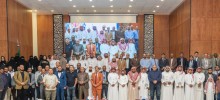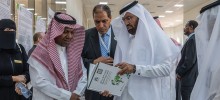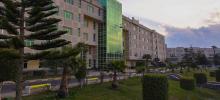Health Healthcare Systems Conference concludes its sessions.

The sessions of the University Health Systems Conference: the concept and the message, which was organized by King Khalid University (KKU) during the period 21 - 22 of this month, was concluded today Thursday in Abha Palace Hotel.
The first session of the second day, was chaired by Dr. Eric Kent Rodinbeck, the Chief Executive Officer (CEO) of the International Union for hospitals (IHF). The session dealt with the topic of complementary work to build a university hospital system. This was through the paper presented by the Vice President of King Saud University for Health Affairs, Dr. Abdul Rahman bin Mohammed Al Muammar, in which he talked about the importance of integrative teamwork, and which has proven to be effective in providing optimal health care for the patient, and in reducing the financial burden on the health organization.
Dr. Al Muammar clarified that the integrative work among the employees of the health sectors was important for strengthening the skills and expertise of employees, which had great impact on the provision of medical service to the patient.
From his side, The Consultant of Endocrinology and Diabetes, who is also the president of CEOs for operation in King Faisal Specialist Hospital, Dr. Abdulrahman Al Naeem, talked bout the health care in the Kingdom of Saudi Arabia, and the need for change in terms of the current situation of health care in the country, which is considered to be a certified health system only for the diagnosis and the treatment of patients, and which is considered to be of high cost and a traditional system.
Dr. Al Naeem stressed on the need of shift to a preventive initiative health system, for the challenges being faced by the Saudi citizen, such as obesity, diabetes, and also other chronic diseases. These and others conditions are creating the need for shift to a preventive initiative health system in order to reduce the financial burden on the health system and to strengthen the public health segments of all the society.
About the subject of the university hospital costs, challenges, and the success strategy, Dr. Ahmed Abu Abaa, the Executive Director of King Abdullah University Hospital, in the Princess Nora Abdul Rahman University, talked about the success story of the establishment of the King Abdullah Hospital. Dr. Abo Abaa clarified that there were 10 challenges facing the construction of a university hospital, which are building the organization strategies, the organizational structure, the human resources, the information technology, the policies and work procedures, the contracts to build the system, the medical equipment and operating and expectations of the beneficiaries, whether they are senior management, or patient, or the staff of the health organization.
In the second session, Professor Gamal Eddin, the Head of Nanotechnology Research Department at the University of McMaster, in Canada, talked about medical imaging and diagnostics with a lower cost of health care, and the importance of the development of low cost of diagnostic devices, which have a high efficiency and quality of matching what is currently being used in the health sector.
Prof. Eddin clarified saying, that represented in making those applications available to the members of community to be a way of helping the patients in the diagnosis of the disease from the beginning, which would help in speeding the reception of the necessary medical service. He requested providing the portable diagnostic devices and applications available on a wide range of community members to help patients and doctors for rapid intervention prior to any complications or health problems, as it is now in the traditional medical system.
Dr. Zaki Al Din Ahmed, the Head of e-Health Association in Pakistan, talked about the future of information technology in the university health systems, and the challenges facing the health sector, which is represented in the high rate of chronic diseases in the community. Dr Zaki also touched on the tremendous development in information technology, and how to get benefits from them to change the style of the individual's life. He demanded the provision and the development of electronic applications that greatly help in the transition from the traditional method to the participation of patients in following-up of their medical records through electronic portals for hospitals. He also called for the need to provide an effective and efficient way for the patient to communicate directly with the medical team.
Finally, it was the turn of Professor Richard Scott, of the University of Calgary, in Canada, who dealt with the role of e-university hospitals in the medical e-learning, where he pointed out to the importance of e-learning, opportunities and challenges facing this educational style. He said: “this modern educational approach seeks to develop provided therapeutic services to patients on IT”.









